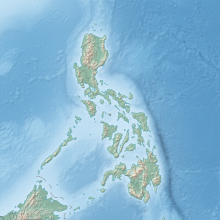Central Cebu Protected Landscape
| Central Cebu Protected Landscape | |
|---|---|
IUCN category V (protected landscape/seascape) | |
 The protected landscape area of Central Cebu with the Pit-os campus of Cebu International School in the foreground | |
| Location | Cebu, Philippines |
| Nearest city | Cebu City |
| Coordinates | 10°30′33″N 123°49′34″E / 10.50917°N 123.82611°E |
| Area | 29,062 hectares (71,810 acres) |
| Established | September 15, 1937 (National park) August 12, 2003 (Protected landscape)[1] |
| Governing body | Department of Environment and Natural Resources |
The Central Cebu Protected Landscape (CCPL) is a protected area located in the mountains and drainage basins of central Cebu in the Philippines.
The CCPL covers what used to be known as the Central Cebu National Park, Buhisan Dam, Mananga Watershed Forest Reserve, Kotkot-Lusuran Watershed Forest Reserve, and the Sudlon National Park.[2] The protected area spans 29,062 hectares (71,810 acres) of adjoining forestlands and watersheds located in the middle of the province. It covers parts of the central Cebu cities of Cebu City, Toledo, Talisay, and Danao, and the municipalities of Balamban, Minglanilla, Consolacion, Liloan and Compostela.
The CCPL houses many of Cebu's endemic and indigenous species.[3] The CCPL is also home to several threatened species, such as the Cebu flowerpecker, black shama, the Cebu cinnamon tree (Cinnamomum cebuense), a rare new kind of orchid, the streak-breasted bulbul, the rufous-lored kingfisher, and the Philippine tube-nosed fruit bat among others. It is in this area where the critically endangered Cebu flowerpecker was rediscovered in 1992. The area is also home to the newly opened Kan-irag Nature Park.[4]
In 2011, the Department of Environment and Natural Resources (DENR 7) planned to conduct a census and registration of residents of the 22 barangays in the reserve. It also filed a criminal complaint against two individuals for cutting trees in the reserve.[5] In 2009, DENR officials had stated that "they are worried that if the forest reserves in Cebu will be destroyed because there are people living there, there will be a water crisis in the province."[6]
See also
References
- ^ "Proclamation No. 441" (PDF). Department of Environment and Natural Resources. Archived from the original (PDF) on 20 October 2014. Retrieved 20 October 2014.
- ^ "Republic Act No. 9486 - AN ACT ESTABLISHING THE BUHISAN WATERSHED FOREST RESERVE, THE MANANGA WATERSHED FOREST RESERVE, THE SUDLON NATIONAL PARK, THE CENTRAL CEBU NATIONAL PARK AND THE KOTKOT-LUSARAN WATERSHED FOREST RESERVE SITUATED IN THE CITIES OF CEBU". www.chanrobles.com. Retrieved 2014-03-26.
- ^ Bagarinao, Ricardo T (2011). "Patch richness and shape complexity in Central Cebu Protected Landscape, Cebu Island, Philippines: Implications in Environmental Management". Asia Life Sciences. 20 (1). Retrieved 2014-03-26.
- ^ "Arroyo signs law on watersheds Archived February 25, 2008, at the Wayback Machine," Sun.Star, June 18, 2007
- ^ Parco, Bernadette (2011-10-22). "Department of Environment and Natural Resources conducts census at CCPL". Sun.Star. Archived from the original on 2014-03-26. Retrieved 2014-03-26.
- ^ "Cebu's protected landscape has 106,000 settlers". balita.ph. 2009-06-12. Retrieved 2014-03-26.
External links
- "Buhisan Watershed: An Adventure to Witness Cebu's Rich Yet Fragile Biodiversity". Adrenaline Romance. Retrieved 2014-03-26.

